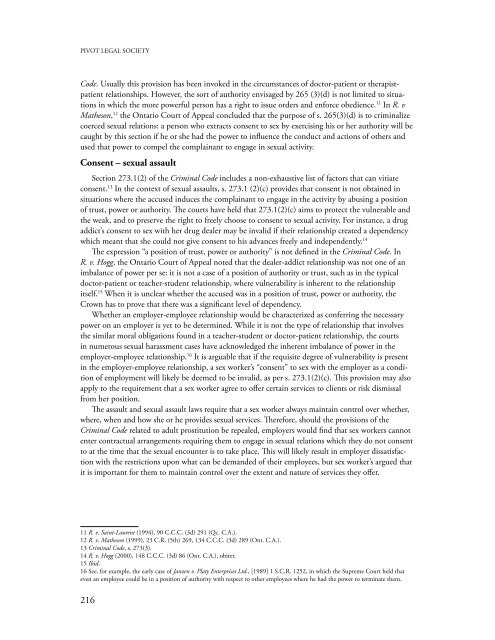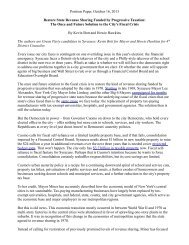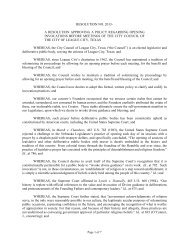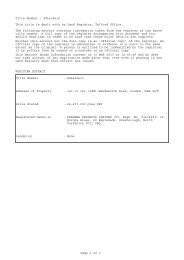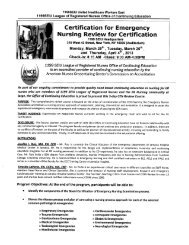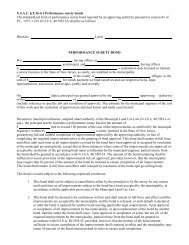Beyond Decriminalization: Sex-work, Human Rights and a New ...
Beyond Decriminalization: Sex-work, Human Rights and a New ...
Beyond Decriminalization: Sex-work, Human Rights and a New ...
- No tags were found...
Create successful ePaper yourself
Turn your PDF publications into a flip-book with our unique Google optimized e-Paper software.
PIVOT LEGAL SOCIETYCode. Usually this provision has been invoked in the circumstances of doctor-patient or therapistpatientrelationships. However, the sort of authority envisaged by 265 (3)(d) is not limited to situationsin which the more powerful person has a right to issue orders <strong>and</strong> enforce obedience. 11 In R. vMatheson, 12 the Ontario Court of Appeal concluded that the purpose of s. 265(3)(d) is to criminalizecoerced sexual relations: a person who extracts consent to sex by exercising his or her authority will becaught by this section if he or she had the power to influence the conduct <strong>and</strong> actions of others <strong>and</strong>used that power to compel the complainant to engage in sexual activity.Consent – sexual assaultSection 273.1(2) of the Criminal Code includes a non-exhaustive list of factors that can vitiateconsent. 13 In the context of sexual assaults, s. 273.1 (2)(c) provides that consent is not obtained insituations where the accused induces the complainant to engage in the activity by abusing a positionof trust, power or authority. The courts have held that 273.1(2)(c) aims to protect the vulnerable <strong>and</strong>the weak, <strong>and</strong> to preserve the right to freely choose to consent to sexual activity. For instance, a drugaddict’s consent to sex with her drug dealer may be invalid if their relationship created a dependencywhich meant that she could not give consent to his advances freely <strong>and</strong> independently. 14The expression “a position of trust, power or authority” is not defined in the Criminal Code. InR. v. Hogg, the Ontario Court of Appeal noted that the dealer-addict relationship was not one of animbalance of power per se: it is not a case of a position of authority or trust, such as in the typicaldoctor-patient or teacher-student relationship, where vulnerability is inherent to the relationshipitself. 15 When it is unclear whether the accused was in a position of trust, power or authority, theCrown has to prove that there was a significant level of dependency.Whether an employer-employee relationship would be characterized as conferring the necessarypower on an employer is yet to be determined. While it is not the type of relationship that involvesthe similar moral obligations found in a teacher-student or doctor-patient relationship, the courtsin numerous sexual harassment cases have acknowledged the inherent imbalance of power in theemployer-employee relationship. 16 It is arguable that if the requisite degree of vulnerability is presentin the employer-employee relationship, a sex <strong>work</strong>er’s “consent” to sex with the employer as a conditionof employment will likely be deemed to be invalid, as per s. 273.1(2)(c). This provision may alsoapply to the requirement that a sex <strong>work</strong>er agree to offer certain services to clients or risk dismissalfrom her position.The assault <strong>and</strong> sexual assault laws require that a sex <strong>work</strong>er always maintain control over whether,where, when <strong>and</strong> how she or he provides sexual services. Therefore, should the provisions of theCriminal Code related to adult prostitution be repealed, employers would find that sex <strong>work</strong>ers cannotenter contractual arrangements requiring them to engage in sexual relations which they do not consentto at the time that the sexual encounter is to take place. This will likely result in employer dissatisfactionwith the restrictions upon what can be dem<strong>and</strong>ed of their employees, but sex <strong>work</strong>er’s argued thatit is important for them to maintain control over the extent <strong>and</strong> nature of services they offer.11 R. v. Saint-Laurent (1994), 90 C.C.C. (3d) 291 (Qc. C.A.).12 R. v. Matheson (1999), 23 C.R. (5th) 269, 134 C.C.C. (3d) 289 (Ont. C.A.).13 Criminal Code, s. 273(3).14 R. v. Hogg (2000), 148 C.C.C. (3d) 86 (Ont. C.A.), obiter.15 Ibid.16 See, for example, the early case of Janzen v. Platy Enterprises Ltd., [1989] 1 S.C.R. 1252, in which the Supreme Court held thateven an employee could be in a position of authority with respect to other employees where he had the power to terminate them.216


